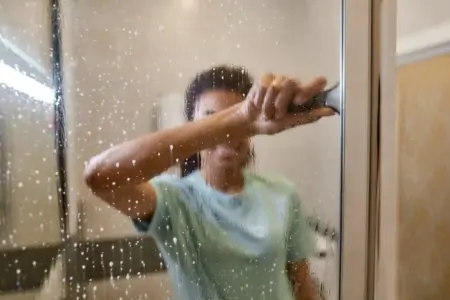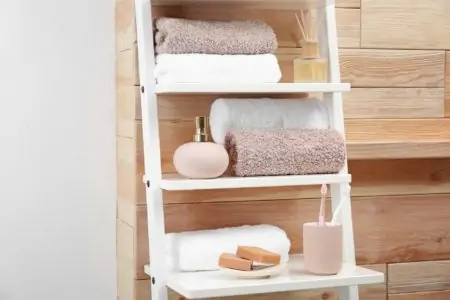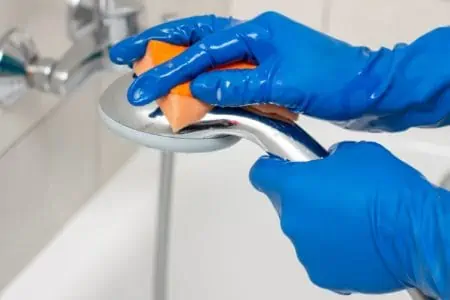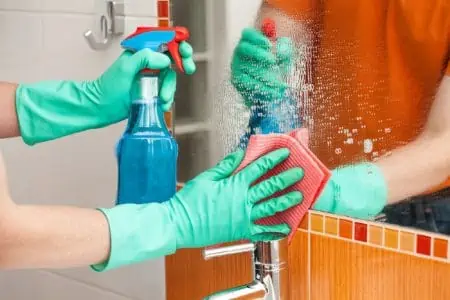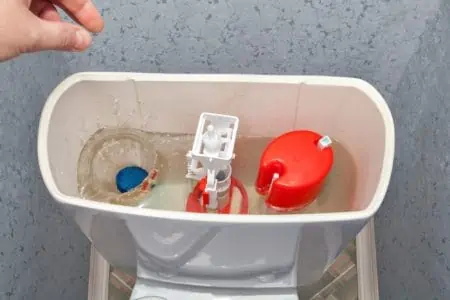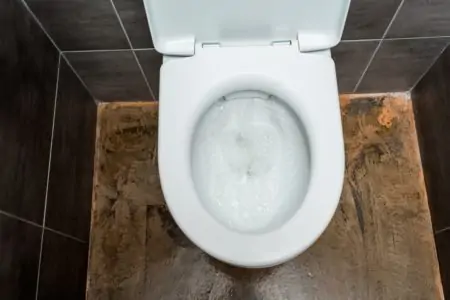Living in a hard water area can lead to frustration in many ways, including staining your lovely shower doors. This can make your bathroom look grubby, even if you have a strict cleaning routine.
We’ve put together 9 methods to try to remove hard water stains from shower doors. If one doesn’t work, you can simply try another until you find the right one for you.
By the end, you’ll have sparkling clean shower doors that make the entire bathroom way more inviting.
Key Takeaways
- Use distilled white vinegar, baking soda, or a commercial cleaner to remove hard water stains from shower doors.
- Alternative methods include using lemon, ammonia, dryer sheets, or a dish soap and vinegar combo.
- To prevent hard water stains, maintain cleanliness, use a squeegee, and consider installing a water softener.
- Hard water stains are not permanent, but they become more challenging to remove over time.
How to Remove Hard Water Stains From Shower Doors
We’ll share 9 methods, including a step-by-step guide for each one.
Distilled White Vinegar
This is a favorite eco-friendly product in our house. When in doubt, distilled white vinegar can usually come to the rescue!
- Put two cups of distilled white vinegar in a bowl and heat it in the microwave for 30 seconds.
- Soak a microfiber cloth in the vinegar.
- Wipe it all over the shower door. Let it soak for five minutes.
- You should start to see the scum break apart. Wipe the shower door again, scrubbing hard to remove build-up.
- Rinse with water.
- Dry thoroughly.
Warning
Vinegar can damage stone, so if you have stone in your shower, make sure to keep the vinegar far away. Alternatively, you can try one of our other methods.
Bar Keeper’s Friend
Bar Keeper’s Friend is a ready-to-use cleaner that works amazingly on shower doors. It can remove soap scum and other mineral deposits. Just be careful because it isn’t non-toxic, so work in a well-ventilated area away from children and pets.
- Shake the bottle well.
- Squeeze some onto a damp sponge.
- Rub all over the shower door.
- After one minute, rinse thoroughly with your shower head.
- Wipe dry.
Top Tip
If you have a fiberglass shower door, be extra gentle when applying since it can scratch quite easily (1).
Baking Soda
Baking soda is another great non-toxic, and eco-friendly way to clean your shower door. Plus, you may already have some in your cupboard.
- Mix half a cup of water with a few spoonfuls of water in a bowl to make a paste. Add more water if it’s not a runny enough paste.
- Use a soft cloth to apply this paste to the shower door. If you run out, make more paste.
- Wait 20 minutes.
- Rinse the baking soda off with distilled white vinegar. Either soak a cloth in the vinegar or put it into a spray bottle.
- Rinse with water.
- Dry well.
Magic Eraser
A Magic Eraser can work well for removing hard water stains from shower doors. You may need to use a few per shower door, so it’s not always the most cost-effective, but the abrasive texture can be really helpful.
- Dampen the Magic Eraser.
- Squeeze it.
- Rub it gently across your shower door, focusing more on the dramatically stained areas.
- Rinse well once the shower door is clean.
Dish Soap and Vinegar Combo
If vinegar didn’t work well for you, surprise yourself by mixing it with dish soap!
- Mix together one cup of dish soap and one cup of distilled white vinegar in a bowl.
- Dip a sponge in the mixture and generously apply it to the shower door.
- Rinse the shower door with your shower head to remove all the soapy residue.
- Clean the shower door with a glass cleaner and paper towel to remove any streaks. Do this on both sides of the door.
- Dry well.
Add a Lemon
Lemon is a great way to budge tough hard water stains and leave a nice scent behind. You can combine this with the baking soda or vinegar method. Just do this first.
- Slice a lemon in half.
- Use the lemon half to rub gently over the hard water stains. Go in circular motions all over the shower door.
- Follow the steps for the baking soda or distilled white vinegar method.
The baking soda can do a little bit of extra hard work before you use one of the other methods.
Ammonia
Ammonia is quite a strong cleaner so open your windows first!
- Mix together a 3:1 ratio of water and ammonia in a spray bottle.
- Spray the shower door with the cleaner generously.
- While it’s still wet, scrub with a soft-bristled brush.
- Rinse the shower door.
- Dry well.
Dryer Sheets
Dryer sheets can be used as more than just softening and removing static from your laundry. To use for removing hard water stains from your shower door, follow these steps:
- Take a dry dryer sheet and wipe over your shower door until the hard water stains are gone.
- If it doesn’t work, put on rubber gloves and dampen the dryer sheet.
- Try rubbing the shower door with the dryer sheet once it is damp.
- Clean with a glass cleaner and microfiber cloth.
Why rubber gloves? There’s something yucky about the texture of holding a damp dryer sheet.
Traditional Cleaner
At the end of the day, you can simply reach for a traditional cleaner that can help to remove hard water stains. This may be quicker and effective, but it also means a trip to the store. Whereas the other methods all pretty much contain supplies that you will already have in the house.
Some recommendations for traditional cleaners include:
- Rejuvenate Scrub-Free Soap Scum Remover.
- Bio-Clean Hard Water Stain Remover.
- Magic Shower Door Cleaner.
Simply follow the specific instructions according to each manufacturer.
How to Prevent Hard Water Stains on Shower Doors
Prevention is actually easier than scrubbing for ages to remove the hard water stains. Here are some great prevention tips:
- Keep your shower doors clean. Make it part of your routine bathroom cleaning to scrub the doors well. Vinegar is a great cleaner to use daily since it won’t cause damage.
- Use a squeegee after each shower to scrape off the residual water. This can prevent the water from leaving stubborn stains.
- If you don’t have a squeegee, wipe the shower doors down with a microfiber towel after each use.
- Use a shower sealant to protect the pores on your shower door from getting affected by hard water stains.
- Install a water softener so your shower door is never subject to hard water in the first place.
